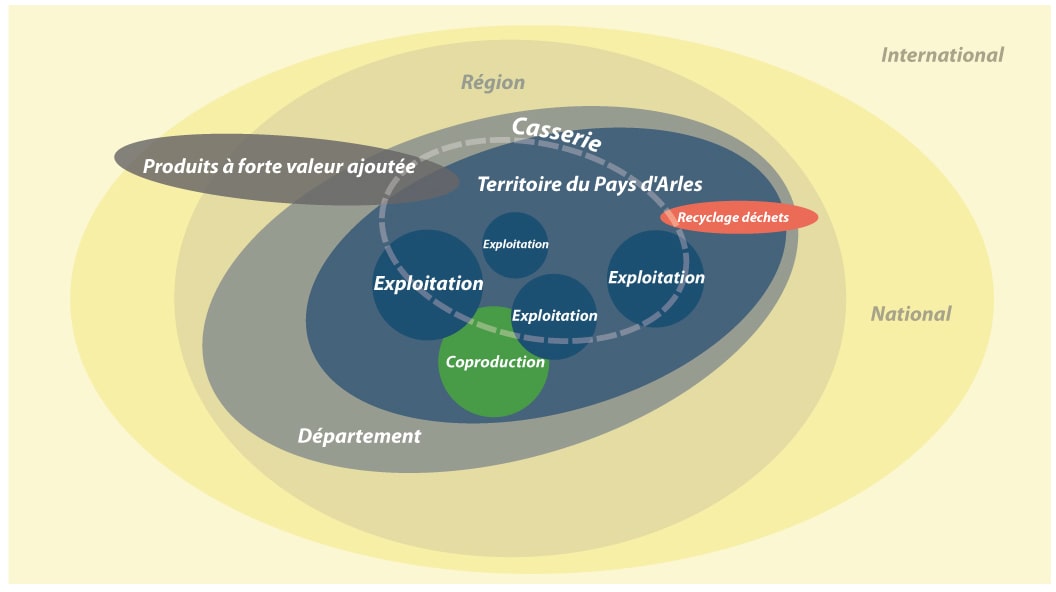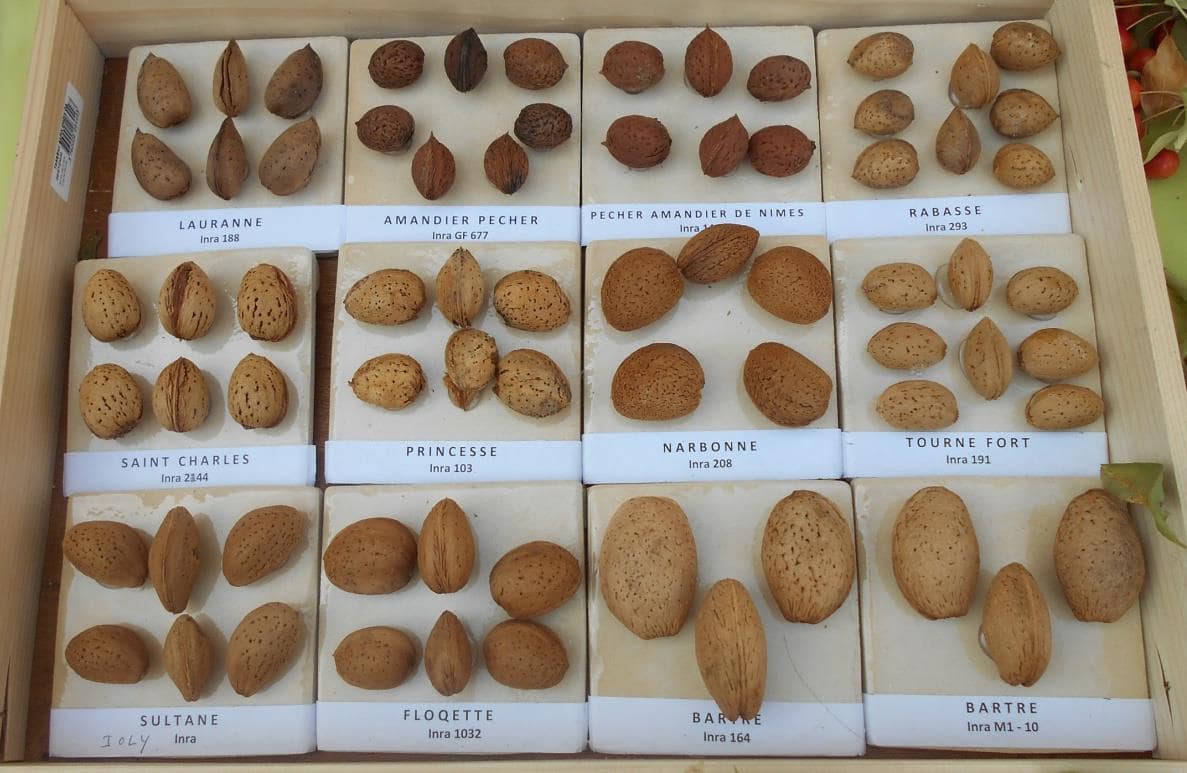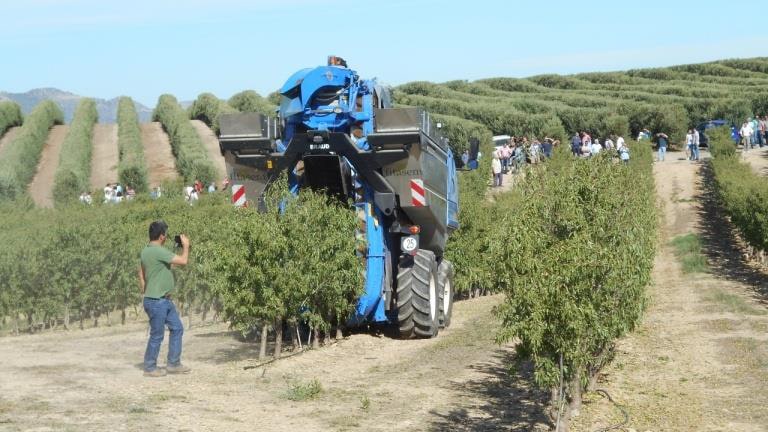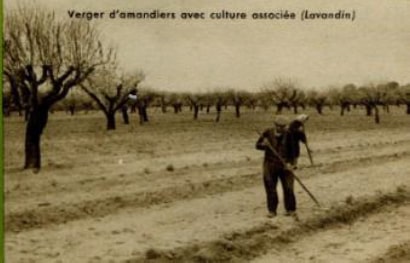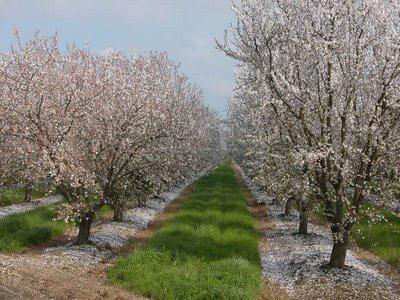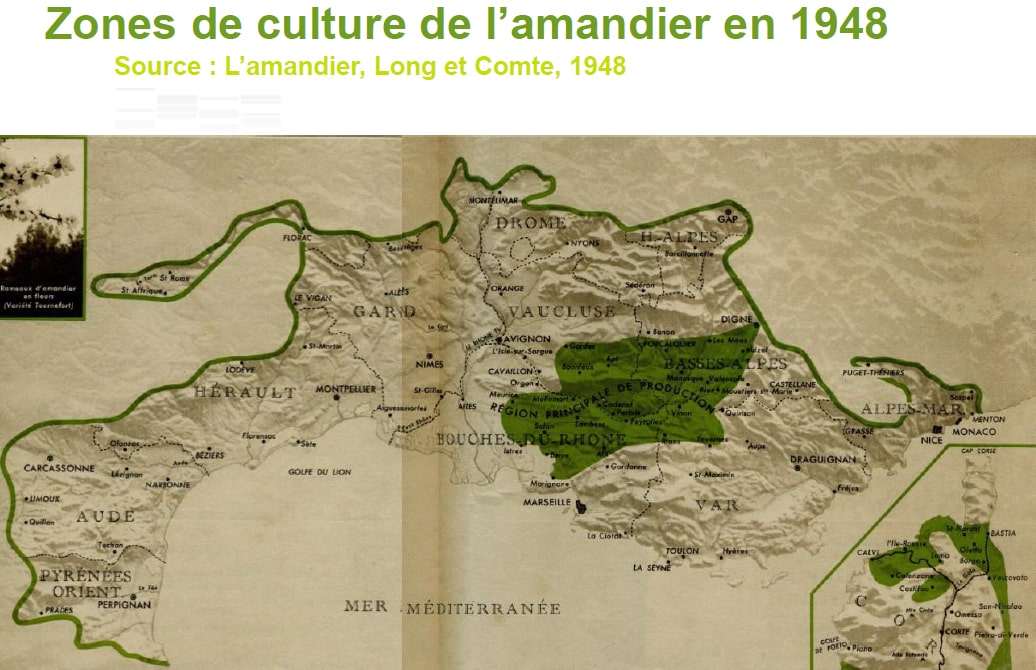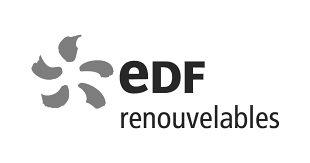“A new concerted approach to industrial ecology (IE) for the Communauté de communes Vallée des Baux-Alpilles”.
This industrial ecology initiative (IE) accompanies the company's submission to the “Prima Agro-Food Chain” European Call for Proposals with the Centre international de Hautes études agronomiques méditerranéennes, as well as a sponsorship from the Fondation de France for an pilot project to reintroduce organic almond production in France.
A project for the valuation of co-products and a transversal approach bringing together different audiences (synergy and pooling between farmers, administrations, associations, and regional stakeholders and residents) was presented during exchanges between the Communauté de communes Vallée des Baux-Alpilles and La Fabrique Terrestre Aquatique et Aérienne at the end of August 2018.
Valuation of co-products from almond and stone fruit production:
- Use of almond hulls and peels as well as stone fruit hulls (potentially from the same breaker, a primary processing tool).
- Sectoral destination of a smaller proportion of woody co-products: agri-food, cosmetics, etc.
- Most of the wood by-products are destined for the energy sector, via the creation of a unit to convert green waste into pellets or even mulch for animals...
The inspiration here is the search for an ethical approach to economic development that is rooted in the local environment, through synergy found between local stakeholders.
Une démarche économique fondée sur la culture locale et qui s’inscrit dans son environnement :
An economic approach based on local culture and in tune with its environment:
- Recovery of the almond industry was prompted by a European project: “Vincent van Gogh's French landscapes”, whose roadmap was to transform a local cultural flow into a regional economic advantage (influenced, among other things, by the Japanese Hanami ritual based on cherry blossoms, and the search for an experiential offering to complement a pictorial cultural offering).
-
The opportunity to relaunch this activity
stems from a convergence between :
- an emblematic local culture
- a favorable geo-terroir and new climatic requirements
- mechanized orchard management
- development for poor soils
- an area and agriculture to be revitalized
- a requirement to reopen land and create firebreaks
- a strong social food tendency
- dynamic, long-term sectors and markets
- a wide gap between domestic production and consumption
- exponential world prices
- The revival of the almond industry was included in the Economic Development Plan of this Communauté de commune (Vallée des Baux-Alpilles) in January 2015, with the aim of linking sustainable economic development to the revival of an agricultural crop within the environmental constraints imposed by the Regional Nature Park.
This relaunch of the organic almond sector has been designed in a systemic way to serve the landscape in its socio-economic and environmental aspects: from production to distribution, through education and regional appeal.
To this end, a range of technical agreements have been put in place to provide strategic and technical support for the stakeholders involved.
In addition to the cross-disciplinary nature of the approach, which brings together different audiences (synergy and pooling between farmers, administrations, associations, schoolchildren and other local stakeholders and residents), the objectives pursued are as follows:
- economic: development of the agricultural and related sectors, creation of jobs and value, setting up of businesses...
- sustainable: promoting biodiversity and the environment, seeking a circular balance, reopening environments...
- cultural: exploring local culture, educational initiatives...
- regional appeal: awareness, attraction of the creative class and links with tourism...
Within this framework, a system has been set up to support farmers in their role as economic players, but also as stakeholders in shaping the landscape.
From upstream (identification of stakeholders, plots of land, companies, production), downstream is proposed: commercial outlets and recycling of co-products and waste in various sectors: Hulls > Energy sector, mulching; Peels > Animal feed sector; Hull meal > Veterinary sector (excipients); Almond skin > Food industry.
The project was presented during discussions between the Communauté de communes Vallée des Baux-Alpilles and La Fabrique Terrestre at the end of August 2018.
- The GIEE (Groupement d'Intérêt Economique et Environnemental – an economic and environmental interest group) label was obtained around the initialion of the “Arboriculture et Culture en Provence Alpilles Crau” association, bringing together a dozen farmers pursuing good environmental practices including: mixed hedges, agro-ecological orchard equipment, management conducive to functional biodiversity, beehives, insect hotels, scree shelters, nesting boxes, etc.
- Building permit application for breaker processing plant underway
- The green waste recovery unit is at the re-calibration stage, extended to the Pays d'Arles as part of its PCAET programme.
- Work on a Greentech/Environment/Landscape business incubator began in summer 2019, with delivery scheduled for September 2020.
- The implementation of a solution to create value from stone fruit production is underway with a collective farmers group at a fruit station
In 2014, the Communauté de communes Vallée des Baux-Alpilles (CCVBA) set up a program to revive almond tree cultivation in favor of the local economy and sustainable production that respects the environment and the constraints of the Regional Nature Park.
- Provence almonds are produced on a large scale and can be processed in a variety of ways: shelled, powdered, sliced, trimmed, toasted, salted, made into paste, cream, oil, etc.; as well as products incorporating almonds, such as vegetable milks, calissons, cookies, nougats, chocolates, etc.
- Almonds are produced for food, cosmetics, health and dermatological purposes ;
- In this context, the CCVBA is committed not only to developing the almond industry, but also to integrating it fully into the local economy through innovative actions to enhance the value of co-products and make concepts work more efficiently.
- The CCVBA is responsive to the use of co-products, alternative energy solutions, the landscape integration of sites and the contributions of producers to the overall attractiveness of the region.
- Other related industries will be associated with this almond sector, notably PPAM (Plantes à Parfum Aromatiques et Médicinales), an ecosystem structured around a Greentech/Environment/Landscape Innovation Center with the Observatoire Français des sols Vivants, the Groupe de Recherche en Agriculture Biologique, the Chambre d'agriculture 13, the LEADER action group and others.
La Fabrique terrestre, aquatique et aérienne : Project team : Christina Ottaviano, Gilles Eeckhoudt, Thomas Metge.
Iconographic credits : DR, Droit Réservé, Mathieu Bameule, La Communauté de communes Vallée des Baux-Alpilles (CCVBA), PNR, GIEE ;
https://WWW.vallee-des-baux-alpilles.fr/mon-quotidien/services-aux-entreprises/les-grands-projets/
https://WWW.vallee-des-baux-alpilles.fr/mon-quotidien/services-aux-entreprises/entreprendre-sinstaller/
